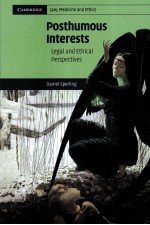图书介绍
POSTHUMOUS INTERESTS LEGAL AND ETHICAL PERSPECTIVES2025|PDF|Epub|mobi|kindle电子书版本百度云盘下载

- DANIEL SPERLING 著
- 出版社: CAMBRIDGE UNIVERSITY PRESS
- ISBN:0521187664
- 出版时间:2008
- 标注页数:273页
- 文件大小:13MB
- 文件页数:301页
- 主题词:
PDF下载
下载说明
POSTHUMOUS INTERESTS LEGAL AND ETHICAL PERSPECTIVESPDF格式电子书版下载
下载的文件为RAR压缩包。需要使用解压软件进行解压得到PDF格式图书。建议使用BT下载工具Free Download Manager进行下载,简称FDM(免费,没有广告,支持多平台)。本站资源全部打包为BT种子。所以需要使用专业的BT下载软件进行下载。如BitComet qBittorrent uTorrent等BT下载工具。迅雷目前由于本站不是热门资源。不推荐使用!后期资源热门了。安装了迅雷也可以迅雷进行下载!
(文件页数 要大于 标注页数,上中下等多册电子书除外)
注意:本站所有压缩包均有解压码: 点击下载压缩包解压工具
图书目录
Introduction1
1 Posthumous harm, posthumous interests and symbolic existence8
Harm9
General9
Interests9
Posthumous harm: the real puzzles15
The experience problem15
Death as harm17
The Epicurean argument19
Surviving interests20
The problem ofretroactivity22
The moment of harm23
Solving the problem of posthumous (non-)existence25
Existence as a possibility25
Existence in after-life27
Harm and change without existence28
Harm in no particular time31
Persistent existence of the Human Subject34
My proposal34
The nature of the Human Subject36
The relation between the Human Subject and the person37
Strengths of the Human Subject model38
Symbolic existence40
The concept of social self43
Legal support for the interest in symbolic existence45
Conclusion47
2 Posthumous rights49
Specific theories of posthumous rights53
Hillel Steiner53
Annette Baier57
Carl Wellman59
Raymond Belliotti61
General theories of rights63
The choice theory63
Critique of the choice theory64
The exclusion of right-holders67
The dead as right-holders69
The interest theory71
Versions of the interest theory73
The idea of interest76
Applying the interest theory to the dead79
Should the dead be actual right-holders?80
Content of posthumous rights83
Duration of posthumous rights84
Conclusion86
3 Proprietary interest in the body of the deceased88
Is there a proprietary interest in the body of the deceased?89
The ‘no property’ rule89
Haynes’ Case90
Coke’s commentary91
R v.Sharpe92
Exelby v.Handyside93
Common law exceptions to the ‘no property’ rule94
Possession with regard to the duty to bury94
The ‘work and skill’ exception103
The ‘long-dead’ exception107
Undermining the ‘no property’ outcomes110
Undermining the ‘no will’ rule111
Undermining the ‘no theft’ rule113
Should there be a proprietary interest in the body of the deceased?114
Possible theoretical models for acquiring property in the body of the deceased114
Transfer of property114
Property vests in the state115
Abandonment117
Res nullius121
The conceptual meaning of a proprietary interest in the body of the deceased122
Ownership123
Possession126
Use and management127
Disposal127
Transferability and the right to enjoy fruits128
General rationales for a proprietary interest131
Property as a natural right131
Property as the advancement of autonomy and freedom132
Property as constituting personality132
Property as a system of distributive justice134
Property as a form of utilitarianism135
Procedural advantages of a proprietary claim with regard to the human corpse136
Conclusion141
4 Determining the disposal of one’s body after death143
Constraints of autonomy interests145
Legal barriers to enforcing bodily testaments150
Alternatives to the will mechanism154
Human tissue gift laws154
Donor cards155
Living wills156
Trust158
Agency163
Contract164
Alternatives to the property classification criterion165
Substantial limitations of enforcing bodily testaments171
Limitations directly established under legislation172
Limitations directly established under case law173
Clear and convincing demonstration by competent and credible testimony173
Reason, decency and accepted customs of mankind174
Limitations indirectly established under case law174
Timing175
Cost176
Practicability177
Harm to society177
Public mores and vulnerabilities of other groups179
A more general opposition to public policy180
Procedural obstacles181
Protection from harm to third parties181
Quality of familial relationship182
Conditioned bodily testaments183
Quality of relationship to place of disposal183
Conclusion184
5 Medical confidentiality after death186
Introduction186
Post-mortem confidentiality in ethics and law188
Ethics of post-mortem conf identiality188
The legal position189
International law189
Canada190
The USA191
The UK192
General justifications for confidentiality194
Consequentialism194
Rights-based justifications196
Privacy196
Autonomy198
Property200
Fidelity (equity)203
The durability of the obligation to act in confidence204
Survivability of the physician-patient relationship204
An analogy from posthumous attorney—client privilege206
The duty to keep promises: a contractual justification207
Practical solutions to breach of confidentiality212
General solutions to post-mortem confidentiality212
More weight to confidentiality during life212
The ‘no-difference’ approach214
More weight to post-mortem confidentiality214
Casuistical case analysis of post-mortem confidentiality215
Disclosure to protect at-risk third parties215
Disclosure in the best interests of another patient216
Disclosure in death certificates216
Autopsy disclosures219
Disclosure prior to performing an autopsy220
Disclosure from the autopsy procedure itself220
Publication of autopsy reports222
Disclosure to providers of disposal services and organ procurement organizations226
Disclosure of research outcomes concerning dead subjects226
Disclosure for teaching purposes229
Disclosure for contesting a will or supporting an insurance claim230
Disclosure of the medical history of public figures231
Conclusion234
Conclusions236
The application of the interest in the recognition of one’s symbolic existence238
The proprietary interest in the body of the deceased238
The testamentary interest in determining the disposal of one’s body after death241
The interest in post-mortem confidentiality243
Possible objections to the idea of symbolic existence244
Subject of interest244
Duration of symbolic existence245
Balancing the interest in the recognition of one’s symbolic existence with other interests246
A right to the recognition of symbolic existence247
Select bibliography250
Index265
热门推荐
- 2290986.html
- 670110.html
- 2183347.html
- 383788.html
- 908994.html
- 2942518.html
- 1740108.html
- 556125.html
- 3367041.html
- 3040880.html
- http://www.ickdjs.cc/book_1618576.html
- http://www.ickdjs.cc/book_1172813.html
- http://www.ickdjs.cc/book_1114539.html
- http://www.ickdjs.cc/book_3524048.html
- http://www.ickdjs.cc/book_661718.html
- http://www.ickdjs.cc/book_2932023.html
- http://www.ickdjs.cc/book_3043247.html
- http://www.ickdjs.cc/book_2893909.html
- http://www.ickdjs.cc/book_853105.html
- http://www.ickdjs.cc/book_1633757.html